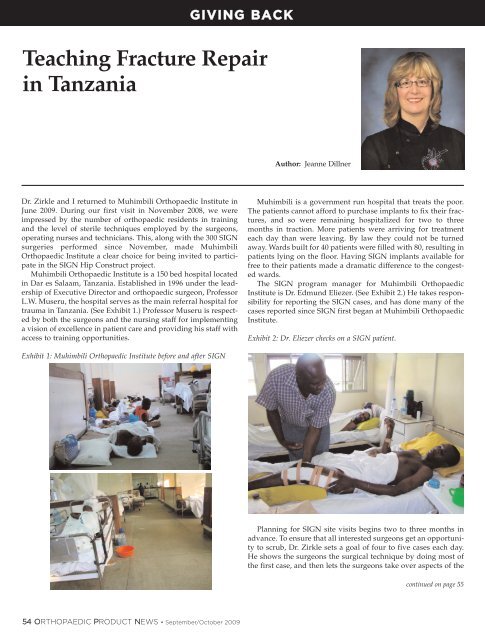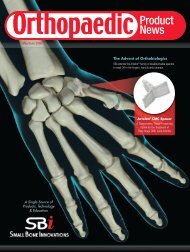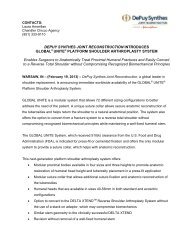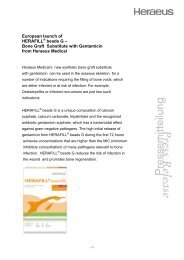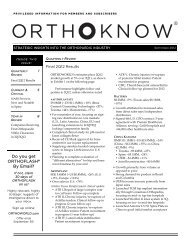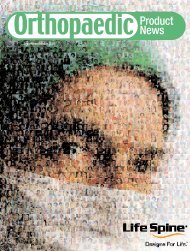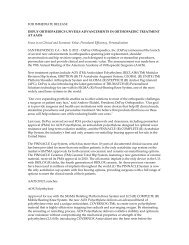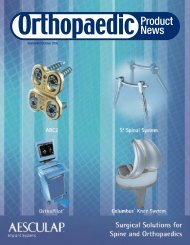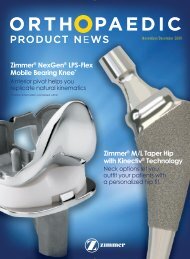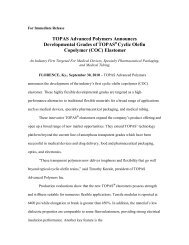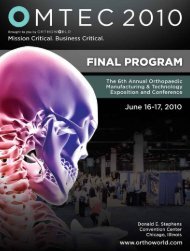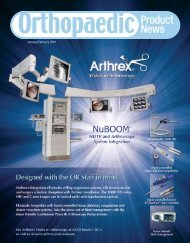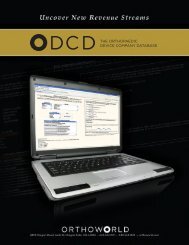Spinal Surgery, Cement Systems - Orthoworld
Spinal Surgery, Cement Systems - Orthoworld
Spinal Surgery, Cement Systems - Orthoworld
Create successful ePaper yourself
Turn your PDF publications into a flip-book with our unique Google optimized e-Paper software.
GIVING BACK<br />
Teaching Fracture Repair<br />
in Tanzania<br />
Author: Jeanne Dillner<br />
Dr. Zirkle and I returned to Muhimbili Orthopaedic Institute in<br />
June 2009. During our first visit in November 2008, we were<br />
impressed by the number of orthopaedic residents in training<br />
and the level of sterile techniques employed by the surgeons,<br />
operating nurses and technicians. This, along with the 300 SIGN<br />
surgeries performed since November, made Muhimbili<br />
Orthopaedic Institute a clear choice for being invited to participate<br />
in the SIGN Hip Construct project.<br />
Muhimbili Orthopaedic Institute is a 150 bed hospital located<br />
in Dar es Salaam, Tanzania. Established in 1996 under the leadership<br />
of Executive Director and orthopaedic surgeon, Professor<br />
L.W. Museru, the hospital serves as the main referral hospital for<br />
trauma in Tanzania. (See Exhibit 1.) Professor Museru is respected<br />
by both the surgeons and the nursing staff for implementing<br />
a vision of excellence in patient care and providing his staff with<br />
access to training opportunities.<br />
Muhimbili is a government run hospital that treats the poor.<br />
The patients cannot afford to purchase implants to fix their fractures,<br />
and so were remaining hospitalized for two to three<br />
months in traction. More patients were arriving for treatment<br />
each day than were leaving. By law they could not be turned<br />
away. Wards built for 40 patients were filled with 80, resulting in<br />
patients lying on the floor. Having SIGN implants available for<br />
free to their patients made a dramatic difference to the congested<br />
wards.<br />
The SIGN program manager for Muhimbili Orthopaedic<br />
Institute is Dr. Edmund Eliezer. (See Exhibit 2.) He takes responsibility<br />
for reporting the SIGN cases, and has done many of the<br />
cases reported since SIGN first began at Muhimbili Orthopaedic<br />
Institute.<br />
Exhibit 2: Dr. Eliezer checks on a SIGN patient.<br />
Exhibit 1: Muhimbili Orthopaedic Institute before and after SIGN<br />
Planning for SIGN site visits begins two to three months in<br />
advance. To ensure that all interested surgeons get an opportunity<br />
to scrub, Dr. Zirkle sets a goal of four to five cases each day.<br />
He shows the surgeons the surgical technique by doing most of<br />
the first case, and then lets the surgeons take over aspects of the<br />
continued on page 55<br />
54 ORTHOPAEDIC PRODUCT NEWS • September/October 2009


